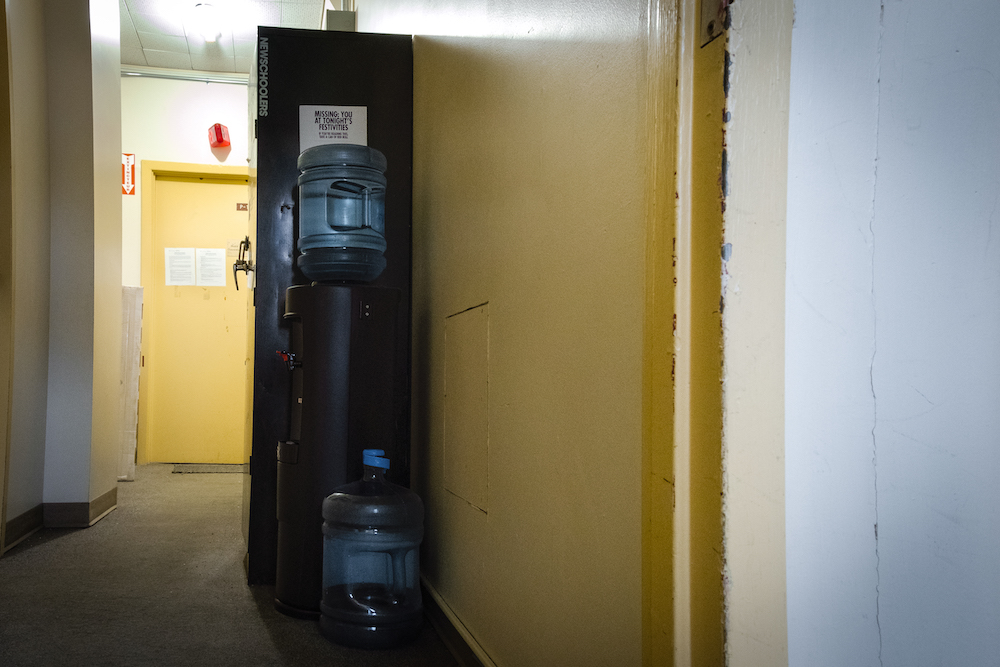Student Organizations feel Concordia’s struggle to permanently address water-advisories is indicative of other maintenance issues
Since water advisories were first posted on Concordia’s downtown campus, little has been done to implement a long-term solution and provide clean running water to Concordia’s annex buildings.
In a September 2021 communication by Concordia Environmental Health and Safety (EHS), it was announced that “preliminary findings appear to indicate the presence of lead in the water of certain annex buildings on the Sir George Williams campus.”
The response by Concordia was to provide water bottles to the annexes, until free standing water coolers were eventually installed. They also posted signage at sinks and faucets.
Further testing was completed to determine the severity of the lead content in the annexes. Following a second test, the water advisory in some buildings was removed. However, many buildings were still determined to have unsafe drinking water and were placed under water advisory. According to Internal Affairs Coordinator of the CSU, Harrison Kirshner, two of the annexes that were particularly affected were the P and K buildings, where many club offices are located.
“There is an investigation that needs to be done. It’s not a quick fix, unfortunately,” said Lina Filacchione, the manager of occupational health and hygiene for EHS. “We have to know where it’s coming from, what the actual problem is before you start to figure out what’s the solution to this.”
The origin of the lead will determine if the water issue falls under the city of Montreal or Concordia’s jurisdiction.
But, the investigation to determine the origins of the lead is delayed and permanently fixing the issue is not Concordia’s first priority at the moment.
“The main issue is really making sure that they have drinking water. That’s the base priority,” said Filacchione.
Despite Concorida’s response, student organizations are feeling uninformed about the situation. Matthew Dodds is the office manager of Concordia’s Graduate Students’ Association, which is based out of the annex. He says the last communication regarding the water advisory came out last November.
“Some updates like ‘we are still testing the water, or here are some infrastructure solutions we’re working on’ would have been nice,” said Dodds. “These are old buildings, we do deserve to know what’s going on in them, we do work in them. We provide services out of them.”
While Dodds and other student organizations affected by the advisory want to be kept in the loop, there is not much more to tell them according to the EHS. “There’s been no new updates since then. We send updates when we are doing some testing,” said Filacchione.
“It’s still ongoing. It’s still on the agenda, but as for the ‘when’ and ‘how long it will take,’ I don’t have the answer for that unfortunately.”
The most likely next step according to Filacchione would be to get consultants to come and determine the source of the lead, but even that has not yet been put into motion.
The lack of communication from Concordia’s maintenance services echoes other issues that Dodds has experienced working out of the annexes.
“It took me two weeks to get a lightbulb changed,” said Dodds. “I wonder sometimes if the maintenance team at the university is smaller than it should be.”
Kirshner has been in communication with the university regarding the water advisory and other maintenance issues. Like Dodds, he says that this response from the university is nothing new. Many organizations have struggled in the past to receive prompt maintenance support.
“It’s important for them to take action, because students deserve to have an on-campus environment no matter what building they’re in, including the P and K annexes. I think those are the annexes that most of student life takes place in, and clubs deserve to have adequate resources in their office space,” said Kirshner.
“It’s typical of this institution. So, for example, the Muslim Students Association have a library at the ground floor of the E annex and the roof is about to collapse. So they can’t use the library. I’ve been trying to follow up [with Concordia] since September on this and they say ‘we’re working on it.’ Well, okay, but what are you doing about it?”
Despite the fact that the university has followed through on their promise to supply water coolers, Kirshner wants to see greater action on maintenance issues.
Kirshner says he has a scheduled meeting with EHS regarding clubs and the annexes in general where he wants to “get the ball rolling” on these issues. But for now, there are no long-term plans to provide clean running water to the annexes other than the installation of water coolers.
Filacchione said they know these spaces are occupied and used by many departments and faculty. “We need to be cognizant of that and make sure we’re meeting their needs.”
Photos by Kaitlynn Rodney
